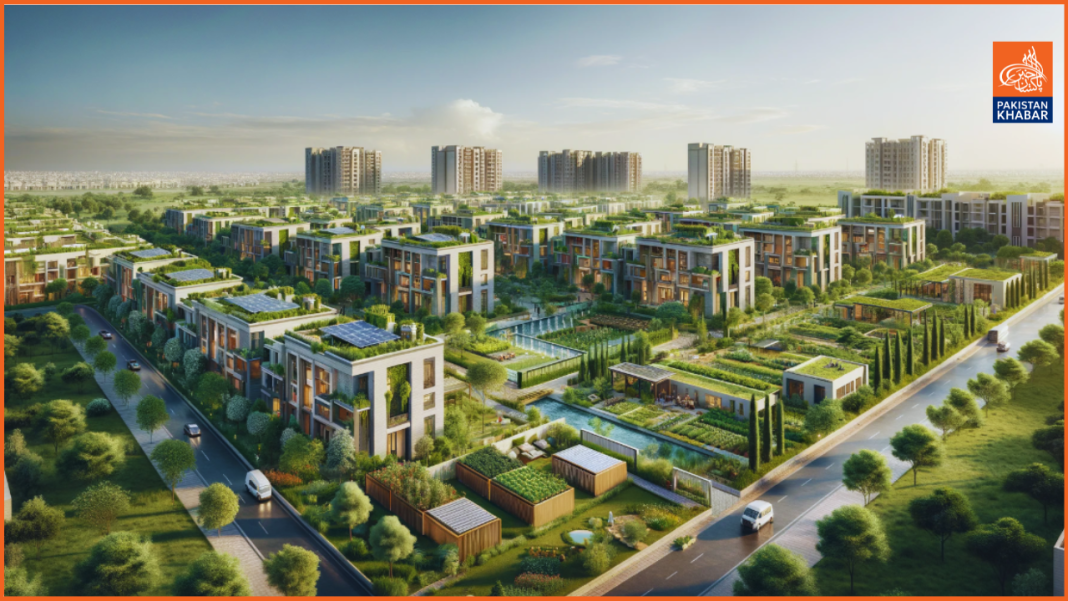Pakistan’s real estate sector, a major contributor to the country’s economy, plays a vital role in shaping its future, but faces growing challenges related to urbanization and environmental sustainability. With the increasing demand for housing, traditional practices in real estate development are proving inadequate in addressing these issues.
Real estate magnate Syed Rehan Gillani is leading the charge for a more sustainable approach, integrating eco-friendly practices and advanced technology into the industry. His vision not only focuses on meeting the country’s housing demands but also emphasizes the preservation of natural resources for future generations.
The Role of Real Estate in Pakistan’s Economy
As one of the largest industries, real estate accounts for approximately 2-3% of Pakistan’s GDP, with a significant impact on related sectors such as steel, cement, glass, and transportation. The growth of mega-projects and housing societies across the country reflects the increasing need for urban infrastructure. However, this rapid development comes with environmental costs, including resource depletion and environmental degradation.
Environmental Impact of Traditional Real Estate Practices
- Excessive Energy Consumption: The reliance on energy-intensive materials like cement and bricks contributes to high levels of greenhouse gas emissions.
- Urban Heat Island Effect: Concrete-heavy construction and a lack of green spaces in cities like Karachi and Lahore contribute to rising urban temperatures, exacerbating climate change.
- Unregulated Waste Disposal: The construction industry generates significant waste, much of which ends up in landfills or water systems, harming ecosystems.
- Strain on Natural Resources: Overuse of resources like sand, limestone, and water is rapidly depleting vital reserves.
Syed Rehan Gillani’s Vision for Sustainable Development
Syed Rehan Gillani advocates for integrating green technologies and sustainable building practices to address these environmental concerns. His strategy includes:
- Green Technologies: Using smart energy systems and sustainable materials in construction.
- Vertical Urbanization: Encouraging high-rise developments to conserve land and reduce urban sprawl.
- Sustainable Infrastructure: Prioritizing green spaces, energy-efficient designs, and waste management systems in housing projects.
Technology Driving Sustainable Real Estate
- Smart Building Systems: IoT-enabled smart buildings optimize energy use with automated systems for lighting, heating, and cooling.
- Renewable Energy Integration: Solar panels, wind turbines, and energy-efficient grids can be incorporated into developments to reduce electricity costs and the national carbon footprint.
- Digital Planning and Modeling: Tools like Building Information Modeling (BIM) simulate energy use, material efficiency, and waste reduction for environmentally friendly construction.
- Eco-friendly Construction Materials: Use of recycled steel, bamboo, and low-carbon concrete can significantly reduce emissions.
- Smart Water Management: Technologies like rainwater harvesting and greywater recycling can help minimize water waste in projects.
Innovative Solutions for a Sustainable Future
- Promote Renewable Energy: Integrating solar power and wind energy in real estate projects can reduce reliance on non-renewable sources.
- Encourage Vertical Urbanization: High-rise buildings can address the housing crisis without consuming valuable agricultural and green land.
- Mandate Green Certifications: Introducing eco-certifications like LEED can encourage developers to adopt sustainable practices.
- Public Awareness Campaigns: Educating the public on the benefits of green housing can increase demand for eco-friendly real estate.
- Government Incentives: Tax breaks, subsidies, and streamlined approval processes can encourage private-sector investment in green projects.
Syed Rehan Gillani: A Visionary Leader
Pakistan’s real estate industry needs forward-thinking leaders like Syed Rehan Gillani to drive change. His commitment to integrating green technologies and sustainable practices positions him as a key figure in reshaping the industry. By blending innovation with eco-conscious strategies, Gillani is setting an example for real estate developers across the country.
Conclusion: A Call to Action
Pakistan’s real estate sector must embrace sustainable practices to address the challenges of urbanization and climate change. By adopting green technologies and supporting visionary leaders like Syed Rehan Gillani, the country can create a real estate industry that serves both economic and environmental goals. The time to act is now—building green is essential for a sustainable future.




